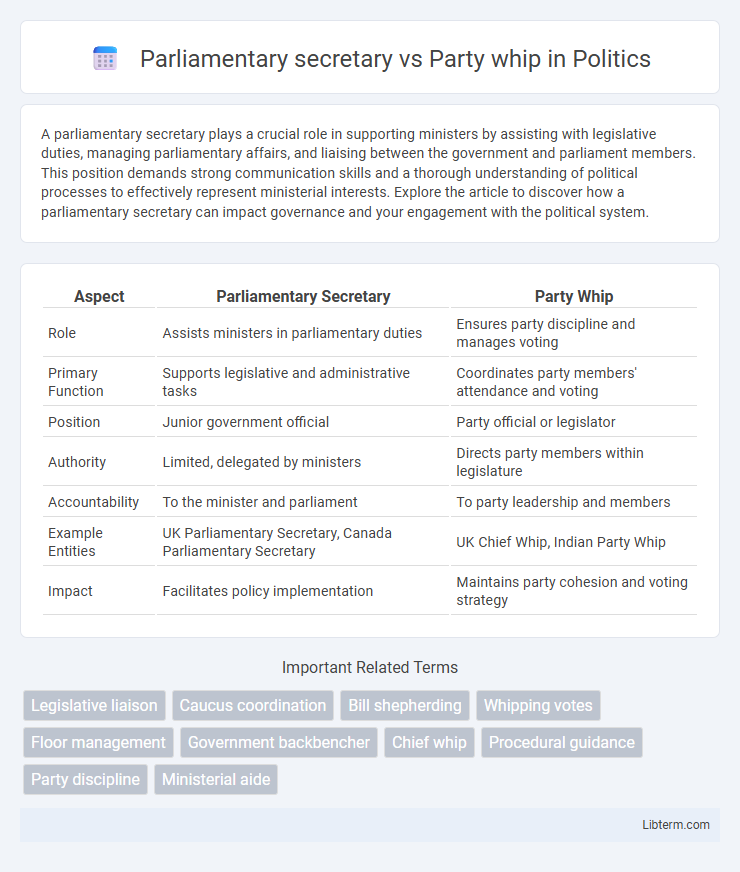A parliamentary secretary plays a crucial role in supporting ministers by assisting with legislative duties, managing parliamentary affairs, and liaising between the government and parliament members. This position demands strong communication skills and a thorough understanding of political processes to effectively represent ministerial interests. Explore the article to discover how a parliamentary secretary can impact governance and your engagement with the political system.
Table of Comparison
| Aspect | Parliamentary Secretary | Party Whip |
|---|---|---|
| Role | Assists ministers in parliamentary duties | Ensures party discipline and manages voting |
| Primary Function | Supports legislative and administrative tasks | Coordinates party members' attendance and voting |
| Position | Junior government official | Party official or legislator |
| Authority | Limited, delegated by ministers | Directs party members within legislature |
| Accountability | To the minister and parliament | To party leadership and members |
| Example Entities | UK Parliamentary Secretary, Canada Parliamentary Secretary | UK Chief Whip, Indian Party Whip |
| Impact | Facilitates policy implementation | Maintains party cohesion and voting strategy |
Introduction: Understanding Parliamentary Roles
Parliamentary secretaries assist ministers by managing legislative duties and facilitating communication between the executive branch and parliament. Party whips enforce party discipline, ensure member attendance during crucial votes, and maintain party cohesion within the legislature. Both roles are pivotal in streamlining legislative processes and reinforcing party strategies in parliamentary systems.
Definition of Parliamentary Secretary
A Parliamentary Secretary is a junior government official appointed to assist a senior minister in managing departmental responsibilities and parliamentary duties. Unlike a Party Whip, whose primary role is to maintain party discipline and ensure members vote according to party lines, the Parliamentary Secretary focuses on supporting legislative processes and facilitating communication between ministers and parliament. This position often serves as a training ground for future ministers by providing practical experience in governance.
Definition of Party Whip
A Party Whip is a key official within a political party responsible for maintaining party discipline and ensuring members vote according to the party's policies during legislative sessions. Unlike a Parliamentary Secretary, who assists ministers in their duties and facilitates communication between the government and parliament, the Party Whip focuses on coordinating the party's voting strategy and managing attendance to secure the desired majority. Effective Party Whips understand parliamentary procedures and play a crucial role in the legislative process by influencing party cohesion and legislative outcomes.
Key Responsibilities of Parliamentary Secretaries
Parliamentary secretaries assist ministers by managing legislative duties, coordinating with government departments, and representing ministers during parliamentary sessions to ensure smooth policy implementation. They handle constituency issues, facilitate communication between ministers and legislators, and support the administration of government programs. In contrast, party whips focus primarily on maintaining party discipline, organizing votes, and ensuring attendance of party members in the legislature.
Core Duties of Party Whips
Party whips primarily ensure party discipline by managing and monitoring members' voting behavior to align with party policies, which is essential for maintaining legislative cohesion. They act as intermediaries between the party leadership and members, relaying instructions and gathering feedback to fortify party strategy. Unlike parliamentary secretaries who assist ministers with departmental duties, party whips focus on vote counting, attendance enforcement, and fostering unity during parliamentary sessions.
Appointment Process: Parliamentary Secretaries vs Party Whips
Parliamentary Secretaries are appointed by the Prime Minister or Cabinet to assist ministers in their duties, often requiring approval from the head of government or parliamentary leadership. Party Whips are selected by party leadership or the parliamentary caucus to maintain party discipline, manage legislative agendas, and ensure member attendance during votes. The appointment of Parliamentary Secretaries emphasizes supporting executive functions, while Party Whips focus on internal party coordination and enforcing party voting cohesion.
Differences in Powers and Authority
Parliamentary secretaries primarily assist ministers by handling legislative responsibilities and representing them in parliamentary sessions, possessing delegated authority but limited independent decision-making power. Party whips exercise authority over party discipline, ensuring member attendance and voting adherence, with significant influence in controlling party behavior and enforcing organizational rules. The key difference lies in parliamentary secretaries' bureaucratic support role versus party whips' enforcement of party cohesion and legislative control.
Impact on Legislative Process
Parliamentary secretaries facilitate the legislative process by assisting ministers in managing government bills and responding to parliamentary inquiries, ensuring efficient communication between the executive and legislative branches. Party whips maintain party discipline during votes, orchestrating attendance and vote direction to secure the passage or blockage of legislation aligned with party strategies. Both roles crucially influence legislative outcomes; parliamentary secretaries streamline policy execution while party whips enforce voting cohesion to shape legislative success.
Parliamentary Secretary vs Party Whip: Comparative Analysis
Parliamentary secretaries assist ministers in managing departmental responsibilities and liaising with parliament, enhancing legislative efficiency, while party whips focus on maintaining party discipline, ensuring members vote according to party lines, and managing attendance during critical votes. The parliamentary secretary's role is more administrative and policy-oriented within the government framework, whereas the party whip holds a strategic position in party cohesion and legislative strategy. Both roles are essential for parliamentary function, but their core objectives differ: one supports executive policymaking, and the other enforces party unity.
Conclusion: Importance of Both Roles in Governance
Parliamentary secretaries play a crucial role in supporting ministers by managing legislative duties and facilitating policy implementation, ensuring smooth government operations. Party whips maintain party discipline, organize voting strategies, and secure legislative support to uphold party cohesion and effectiveness. Both roles are indispensable for maintaining functional governance, enabling coordinated decision-making and legislative success in parliamentary systems.
Parliamentary secretary Infographic

 libterm.com
libterm.com